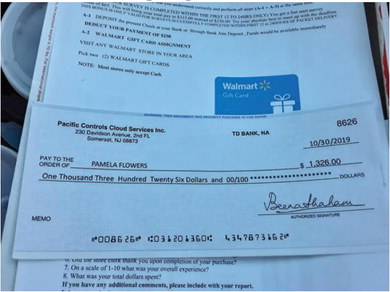Scam Alert: Residents receiving bogus checks in the mail

Marion woman takes to social media to warn others
ralphhardin@gmail.com We’ve all gotten that “too good to be true” letter in the mail letting us know we’ve “won” the sweepstakes (that we never entered) or that we can take this key over to the car dealership and if it fits the car, we win it, or even those “urgent warning” letters that we have to act now or the IRS is going to come confiscate all our worldly possessions.
By now, most folks are wise to the game, but scammers are constantly coming up with new and inventive ways to try and bilk us out of our hardearned money. Email and internet “phishing” scams are just a pop-up ad away when we’re online, but the good old U.S. Mail still has it share of shysters and swindlers preying upon the unsuspecting consumer.
Marion resident Pam Flowers was recently the target of a mail scam, but she was savvy enough to see through the charade and took to Facebook to spread the word to those who might be susceptible to a fairly legitimate scheme.
“If you have gotten anything like this in the mail, it screams SCAM!”
Flowers posted on Monday afternoon. “Just FYI, I got this in the mail today, and I don’t want someone naive to fall for it.”
In her post, Flowers added a few photographs of a legitimate looking letter purported to be a “Walmart Retail Survey” that offered the recipient the opportunity to earn a quick $250 by simple taking the enclosed check for $1,250, depositing it in their bank, going up to Walmart, putting $1,000 on two gift cards of $500 each, texting all the necessary gift card information to a provided number so it can be cashed out, and keeping the leftover $250 as payment for yourself.
“The company on the check is based out of Dubai, the address on the check says New Jersey, the return address on the envelope says Colorado, and the area code for the number to text or email is in Kentucky,” said Flowers.
For those not hip to the scam, the check is no good. Only you wouldn’t know that until after you’ve made the deposit and sent the scammers their money (your money). Your bank will get an insufficient funds notice from the other bank, but you’ve already spent the $1,000, so it just creates a nightmare scenario where you’ve lost money and likely exposed your personal information to the thieves.
It did not take long for other residents to offer their own experiences.
Sonya Willhite said, “I have gotten two of those so far. I just tossed them in the garbage” Sandra Alford said, “Yep, I have gotten two just like that. Trash them!”
“How could anyone fall for this?” asked Tonya Deuce Flowers replied, “Sadly to many people do fall for it, but I’m not one. I was confused on why it was sent to me. and immediately said ‘this is bogus.’ I just wanted to share this with those who may believe that it’s real, when it’s not.”
Rachel Dickson-Humes compared it to a similar online scheme that, again, looks completely legitimate on the surface to some people.
“That is the (the same as the) survey thing online…
win $1,000 Walmart card, she said, adding “It usually pops up after someone has been watching porn… lol.”
Anne J. Creekmore noted that she had received “several, in many addressee names.”
The Walmart survey scheme is just one of many scams that cycle through the mail and internet. With the holidays coming up, many scam operations intensify their efforts, many disguising themselves as legitimate nonprofits and charity organizations.
Ahead of the holiday season Arkansas Attorney General Leslie Rutledge recently issued a consumer alert urging Arkansans to be sure any Thanksgiving or Christmas donations being made are getting into the right hands.
“Con artists and criminals will take advantage of every opportunity to use Arkansans’ generosity to funnel money into their sham charities,” said Attorney General Rutledge. “I urge all Arkansans to be cautious and ask questions of those soliciting donations to ensure donations go to those in need.”
Rutledge released a list of tips to help consumers verify an organization’s legitimacy before giving money: • Ask questions before giving. Legitimate charities will be happy to answer questions and will not rush a donation.
• Ask for written information or research the organization online. A legitimate charity will send information that provides the organization’s mission and how the donation will be used, along with proof that the contribution is tax deductible.
• Call the charity directly.
To avoid falling victim to sham solicitors, personally contact the charity before giving a donation online, to the person knocking at the front door or to a telephone solicitor to ensure it is not a scam.
• Never send cash. For security and tax records, make donations by check or credit card.
• Search the Arkansas Charities Database for more information on charities in Arkansas and Charity Navigator for more information on charities across the United States.
And no matter who you’re giving your money to, no legitimate company, business, nonprofit or governmental organization is going to ask you to load up a Walmart gift card.




